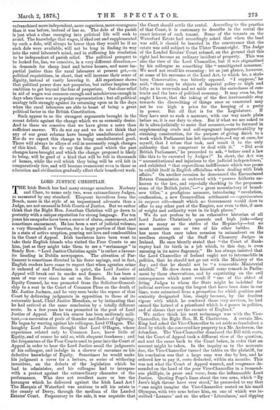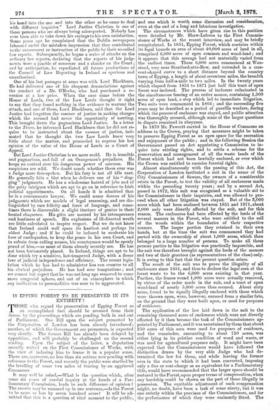LORD JUSTICE CHRISTIAN. T HE Irish Bench has had many strange
members. Norbury and Clare, to name only two, were extraordinary Judges, as measured by any standard. Eloquent invectives from the Bench, more in the style of an impassioned advocate than a Judge, are not unusual in Irish Courts of Justice. But we rather think that the Right Hon. Jonathan Christian will go down to posterity with a unique reputation for strong language. For ten years his escapades have been a source of alarm, amazement, and sometimes amusement. He has been a sort of judicial volcano, a very Stromboli or Vesuvius, for a large portion of that time in a state of active eruption, pouring out lava and combustibles in the Court of Appeal. Irish barristers have been wont to take their English friends who visited the Four Courts to see him, just as they might take them to see a "scrimmage " in Sandy Row. " Lord Justice Christian again " is rather a favour- ite heading in Dublin newspapers. The attention of Par- liament is sometimes directed to his fierce sayings, and in fact, English readers have come to expect that when agrarian crime is unheard of and Fenianism is quiet, the Lord Justice of Appeal will break out in smoke and flames. He has been a man of war ever since he sat on the Bench. An eminent Equity Counsel, he was promoted from the Solicitor-General- ship to a seat in the Court of Common Pleas on the death of Mr. Justice Jackson, and he very soon broke the repose of that Court by delivering judgments in opposition to those of its autocratic head, Chief Justice Monahan, or by intimating that he had arrived at the same conclusion by a totally different route. In a few years he was promoted to the post of Lord Justice of Appeal. Here his course has been uniformly mili- tant,—a succession of peals of thunder and flashes of lightning. He began by warring against his colleague, Lord O'Hagan. The haughty Lord Justice thought that Lord O'Hagan, whose experience related only to Common Law, knew little of Equity, and of course he said so, with eloquent frankness ; and the frequenters of the Four Courts used to pour into the Court of Appeal in order to hear the Lord Justice assail the judgments of his colleague, and indulge in a shower of sarcasms on hie defective knowledge of Equity. Sometimes he would make his judgment a cover for a lecture, or series of withering invectives, on the defects of the legislation which he had to administer, and his colleague had to interpose with a protest against the extraordinary character of the performance. Who does not recollect more or less the harangue which he delivered against the Irish Land Act ? The Marquis of Waterford was anxious to sell his estate in the county of Deny, through the medium of the Landed Estates' Court. Preparatory to the sale, it was requisite that the Court should settle the rental. According to the practice of that Court, it is customary to describe in the rental the exact interest of each tenant. Some of the tenants on the Waterford Estate had accordingly asked that when the land was sold, it should be inserted in the conveyance that the estate was sold subject to the Ulster Tenant-right. The Judge of the Landed Estates' Court refused, on the ground that this right had become an ordinary incident of property. This was also the view of the Lord Chancellor, but it was stigmatised by his colleague as something like " unmitigated nonsense.' We need not recall his reasoning ; let us just glance, however, at some of his sarcasms at the Land Act, to which he, a stub- born Conservative, was bitterly opposed. " I suppose," he said, " there may be objects of Imperial policy so high and lofty as to over-rule and set aside even the sacredness of con- tracts and the laws of political economy. It may even be, for aught I know, that the taking of the first irretraceable step towards the discrediting of things once so venerated may not be too high a price for the keeping of a party in power. But all that is for the Legislature. If they have sent us such a measure, with our way made plain before us, it is our duty to obey. But if what we are asked to do is ultra-judicially to assist that measure,—to be forward in supplementing crude and self-repugnant impracticability by straining construction, for the purpose of giving finish to a work which Parliament has left incomplete,—I say at once, for myself, that I refuse that task, and remit it to the only authority that is competent to deal with it." " Did ever British Parliament," he proceeded to ask, " before send a law like this to be executed by Judges I" In short, the Act was " unconstitutional and injurious to the judicial independence," and exhibited " that supercilious indifference which was prone to exhibit itself in English officialism when dealing with Irish affairs." On another occasion he denounced the Encumbered Estates Commission as endowed with "powers hitherto un- known to the law, and especially shocking to the preposses- sions of the British jurist,"—" a great manufactory of brand- new titles," a prodigious measure, introducing " revolution, confiscation, a new Cromwellian settlement — experimentum in corpore vili—insult which no Government would dare to offer to any other part of the Empire, nor even to this, if men of weight and authority were in its high places." We do not profess to be an exhaustive historian of all Lord Justice Christian's quarrels and high jinks—they are as many as the strifes of the Heptarchy—but we must mention one or two of his other battles. He has more than once taken occasion to animadvert on the needless strength of the Staff of Chancery Judges in Ireland. He once bluntly stated that " the Court of Bank- ruptcy had its birth in a job which, to this day, is even amusing in its naïve flagrancy." He has always insisted that the Lord Chancellor of Ireland ought not to intermeddle in politics, that he should not go out with the Ministry of the day ; and that he should not be "a removable Ministerial satellite." He drew down on himself some remark in Parlia- ment by these observations, and by expatiating on the evil consequences which must result if " one of the ablest of living Judges to whom the State might be indebted for judicial services among the largest that have been done in our time, were ostracised from a promotion for which position and seniority designated him, simply because, by the fearless vigour with which he rendered those very services, he had earned the hatred of a priesthood which is a power in politics, and of classes that are the enemies of England."
We rather think his next scrimmage was with the Vice- Chancellor, the Right Hon. H. E. Chatterton. A certain Mrs. King had asked the Vice-Chancellor to set aside as fraudulent a deed by which she conveyed her property to a Mr. Anderson, the defendant. The Vice-Chancellor dismissed the Bill with costs, but the Court of Appeal took a different view of the question, and sent the cause back to the Court below, in order that an account might be taken. In the inquiry as to the accounts due, the Vice-Chancellor turned the tables on the plaintiff, for his conclusion was that a large sum was due by her, and he ordered her to pay it, costs deducted, within six months. This was not what the Court of Appeal wanted, and vengeance de- scended on the head of the poor Vice-Chancellor in a tremend- ous phillipic, in prose and verse, from the inflammable Lord Justice. Quoting Pope's lines about the two urns, which " By Jove's high throne have ever stood," he proceeded to say that " one might imagine the Vice-Chancellor seated on his small Olympus, with two urns before him, on one of which was in- scribed' Laxness' and on the other ' Literalness,' and dipping his hand into the one and into the other as he came to deal with different inquiries." Lord Justice Christian is one of those persons who are always being misreported. Nobody has ever been able to take down his sayings to his own satisfaction. Some years ago he complained that the Dublin newspapers laboured under the mistaken impression that they contributed to the amusement or instruction of the public by their so-called law reports. Subsequently, he began a series of attacks on the ordinary law reports, declaring that the reports of his judg- ments were a jumble of nonsense and a slander on the Court ; and by anticipation, he repudiated all future productions of the Council of Law Reporting in Ireland as spurious and unauthorised.
One of his last passages at arms was with Lord Blackburn. He had delivered one of his eloquent denunciations against the conduct of a Mr. O'Rorke, who had purchased a re- version at a low price. When the case came before the House of Lords, two of the Law Lords thought it right to say that they found nothing in the evidence to warrant the attack, and one of them, Lord Blackburn, said that the Lord Justice had forgotten the essence of justice in making charges which the accused had never the opportunity of meeting. This brought down the pugnacious Lord Justice. In a letter to the Times, he informed Lord Blackburn that he did not re- quire to be instructed about the essence of justice, inti- mated that he thought the two Law Lords knew very little about the matter, and proceeded to express his low opinion of the value of the House of Lords as a Court of Appeal.
But Lord Justice Christian is no mere scold. He is irascible and pugnacious, and full of an Orangeman's prejudices. He keeps no control over his dangerous power of sarcasm. His suspicions are wild. We doubt much whether there ever was a Judge more free-spoken. But his -fury is not all idle rant. He generally hits a blot when he delivers one of his " slog- ging" judgments. He has a wholesome hatred of jobs and of the petty intrigues which are apt to go on in reference to Irish judicial appointments. On all hands it is admitted that he is a consummate lawyer. We could name dozens of his judgments which are models of legal reasoning, and are dis- tinguished by rare felicity and force of language, and some- times there is discernable a slight tincture of genius in their heated eloquence. His gifts are marred by his intemperance and hastiness of speech. His explosions of ill-directed wrath are little calculated to inspire respect. But we do not know that Ireland could well spare its hastiest and perhaps its ablest Judge ; and if he could be induced to moderate his love of earthquakes, to keep the peace in his own Court, and to refrain from calling names, his countrymen would be openly proud of him,—as most of them already secretly are. He has not been fortunately placed. In Ireland, things are apt to be done which try a sensitive, hot-tempered Judge, with a fierce love of judicial independence and efficiency. The recent legis- lation which he has had to administer has run counter to all his clerical prejudices. He has had sore temptations ; and we cannot but regret that he was not long ago removed to some more congenial sphere, and out of an atmosphere in which any inclination to personalities was sure to be aggravated.



































 Previous page
Previous page